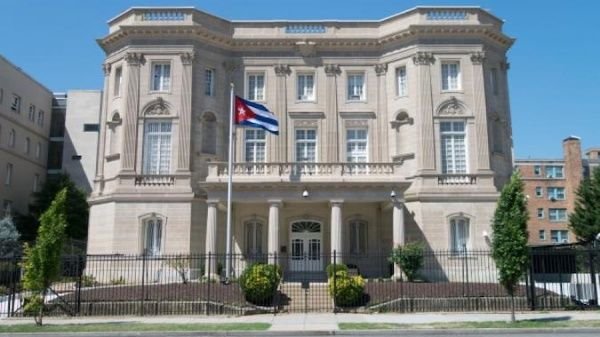Cuba’s embassy in the US capital of Washington DC was the target of a violent attack late on Sunday, September 24. In a statement shared on the platform X, formerly known as Twitter, the Cuban Foreign Minister Bruno Rodriguez said that an individual had thrown two Molotov cocktails at the embassy building.
He added that no personnel had been injured in the attack and the details of the incident were being looked into. He also noted that this was the second such attack against the headquarters of Cuba’s diplomatic mission in the US. An individual had fired multiple rounds of bullets from an AK-47 assault rifle at the building in April 2020.
Cuba’s embassy in France was also attacked with Molotov cocktails in July 2021.
“Anti-Cuban groups resort to terrorism because they feel impunity, something Cuba has warned US authorities about,” Rodriguez said.
In a report released in 2020, Cuba’s Center for Historical Investigations of State Security (CIHSE) documented 581 attacks against the country’s diplomatic representations abroad since the Cuban Revolution in 1959. These attacks have led to the deaths of approximately 365 people and injured 721, including foreign nationals.
Sunday night’s attack took place just hours after President Miguel Díaz-Canel arrived back in Havana after attending the 78th Session of the United Nations General Assembly in New York. Cuba is currently serving as the chairman of the G77+China bloc of countries.
While the US State Department is yet to issue an official statement on the incident, Cuba has received an outpouring of support from progressive, anti-war, and socialist organizations within the country.
“We demand an investigation into this crime. The US government should stop protecting terrorists,” Manolo De Los Santos, director of the People’s Forum, a movement incubator working class and marginalized communities based in New York City, said on X.
“We call on the US government to address these attacks as the acts of terrorism that they are and we call on the people of the US to stand with Cuba, to show your support, and to call on the US to end the blockade, to end the war on Cuba,” said Calla Walsh, a US-based anti-war organizer with the National Network on Cuba (NNOC)
“You can see the facade of the building is covered in bullet holes,” Walsh said in a video statement on Sunday, referring to the 2020 attack on the embassy.
The NNOC has called on people in the US to arrive at Cuba’s embassy in DC at 5pm on September 25 to express their solidarity with the country. Other organizations, including Puentes de Amor (Bridges of Love) and the DC chapter of the Communist Party of the USA, have also condemned the attack.
Meanwhile, Cuba also received messages of support from other countries. “We condemn this new terrorist attack against the sovereign integrity of Cuba, and we stand in solidarity with its people and authorities,” said Venezuelan Minister of Foreign Affairs Yvan Gil.
“We stand in solidarity with the people and Government of Cuba in the face of tonight’s attack on the Cuban Embassy in Washington DC. Mexico condemns all types of political violence,” said the Mexican Foreign Ministry. Mexico’s government has called for a thorough investigation and for those responsible to be brought to justice.
Medea Benjamin, co-founder of US-based anti-war group CODEPINK, said, “While the US accuses Cuba of sponsoring terrorism, Cuba is constantly a victim of terrorist attacks.”
In 2021, former US President Donald Trump added Cuba to the list of countries designated by the US as “State Sponsors of Terrorism” (SSoT). The move has had far-reaching consequences for Cuba, disrupting not only trade but also the supply of critical goods such as fuel and medicines to the country.
The SSoT designation was a continuation of a series of unilateral, inhumane, and illegal measures, which include the ongoing six-decade-long blockade, to stifle the Cuban Revolution and Cuba’s socialist project.
Activists and social movements in the US have continued to organize to demand that the US cease its attack on the country. On September 22, people flooded the streets of NYC with a clear message: “Cuba, yes! Blockade, no!”
Watch: People’s movements in the US demand end to blockade against Cuba
President Díaz-Canel addressed the solidarity demonstration and later joined hundreds of people for the “Voices of Dignity: People vs Blockades” solidarity event held in NYC on September 23.
“We firmly believe, as Fidel taught us, that there is no power in the world that can beat the power of truth and of ideas. We will continue to be alongside you as you fight for Cuba, as you fight for socialism and as you fight for social justice…We shall be successful and we shall overcome!” he declared.





